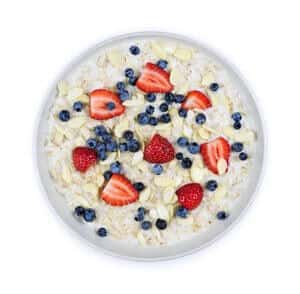
Oats have been a dietary staple for many centuries, and they have a reputation as a healthy whole grain. Eating cooked oatmeal on a regular basis (daily or several times a week) can help control cholesterol. People who eat whole grains, including cooked oatmeal from rolled or steel-cut oats, lower their likelihood of cardiovascular disease, type 2 diabetes and certain cancers (Seal & Brownlee, Proceedings of the Nutrition Society, Aug. 2015). In addition, people who eat more whole grains and vegetables and less processed foods ward off gum disease better (Salazar et al, Journal of Clinical Periodontology, July 2018). But what about the more convenient instant oatmeal? How does it differ from cooked oats?
Does Oatmeal Have Nutritional Value?
Q. I have been eating oatmeal for years as a way to lower cholesterol. I normally add some fruit and a tablespoon of nut butter as I cook it to make it tastier and healthier.
Over the last few months, I have read articles stating that oatmeal is not a healthy option for breakfast but rather propaganda from the food companies just to sell their products. One author went so far as to say that oats are only good for horses! Needless to say, I am now very confused and concerned regarding this controversy. Can you please help shed some light on this matter?
A. According to New Scientist, people have been eating oats for more than 30,000 years. We think it is safe to say that this whole grain can be part of a healthful diet.
You are correct that eating steel-cut oats or oat bran can lower cholesterol (Nutrition, Metabolism, and Cardiovascular Diseases, Oct. 2023). In addition, it can help control blood pressure and blood sugar.
There are different kinds of oatmeal, though. The preparation you describe sounds excellent, providing additional protein, fat and phytonutrients along with the grain. Instant oatmeal is probably not quite as good for you, because it is often sweetened with sugar or sugar substitutes. In addition, the grain is highly processed to make it “instant.” Keep reading to learn why this might be a problem for some people.
Is Cooked Oatmeal Better Than Instant Oatmeal?
Q. I have been eating instant oatmeal five days a week for many years now. I have read that instant oatmeal is somehow nutritionally inferior to regular oatmeal that must be cooked. Is this true, and if so, why?
Glycemic Index of Cooked Oatmeal and Instant Oatmeal:
A. Instant oatmeal has been processed so that it requires only boiling water or a minute in the microwave. It has a higher glycemic index than whole grain oats. As a result, it is likely to raise blood sugar more quickly than whole-grain oats. In addition, many instant oatmeal varieties are sweetened, which would further increase the blood sugar response.
Instant oatmeal is better in this respect than cold cereal made of oats, however. In a randomized crossover trial, people were less hungry when they ate instant oatmeal than when they had a bowl of cold oat breakfast cereal (Rebello et al, Journal of the American College of Nutrition, Aug. 14, 2016). Both steel-cut oats and old-fashioned cooked rolled oats raise blood sugar less than Cream of Rice or Honey Nut Cheerios (British Journal of Nutrition, June 2019).
Can You Get a Nutritious Breakfast in a Hurry?
If you don’t have time to cook regular oatmeal in the morning, you might try cooking it the night before or soaking the oats overnight to speed cooking. That way you would still get the “whole-grain benefit” you are currently missing with instant oatmeal. Even with sugar added, Quick Oats raised blood sugar less than Cream of Wheat (Wolever et al, Clinical Nutrition ESPEN, Dec. 2016). Nonetheless, for even better nutritional value, you might consider sweetening your oatmeal with fruit instead of sugar.
Another possibility: add a tablespoon or two of oat bran to your instant oatmeal. One study showed that beta-glucan from oat bran lowers the glycemic index of instant oatmeal (Wolever et al, Food & Function, March 1, 2018).
Savory Oatmeal with Greens:
There’s no rule that oatmeal has to be sweet. Here’s another take on oatmeal, though you may need a subscription to The New York Times to grab it.
Citations
- Seal CJ & Brownlee IA, "Whole-grain foods and chronic disease: evidence from epidemiological and intervention studies." Proceedings of the Nutrition Society, Aug. 2015. DOI: 10.1017/S0029665115002104
- Salazar CR et al, "Better-quality diet is associated with lower odds of severe periodontitis in US Hispanics/Latinos." Journal of Clinical Periodontology, July 2018.
- Zhu R et al, "Effects of cereal bran consumption on cardiometabolic risk factors: A systematic review and meta-analysis." Nutrition, Metabolism, and Cardiovascular Diseases, Oct. 2023. DOI: 10.1016/j.numecd.2023.04.020
- Rebello CJ et al, "Instant oatmeal increases satiety and reduces energy intake compared to a ready-to-eat oat-based breakfast cereal: A randomized crossover trial." Journal of the American College of Nutrition, Aug. 14, 2016. DOI: 10.1080/07315724.2015.1032442
- Wolever TMS et al, "Impact of oat processing on glycaemic and insulinaemic responses in healthy humans: a randomised clinical trial." British Journal of Nutrition, June 2019. DOI: 10.1017/S0007114519000370
- Wolever TMS et al, "Effect of serving size and addition of sugar on the glycemic response elicited by oatmeal: A randomized, cross-over study." Clinical Nutrition ESPEN, Dec. 2016. DOI: 10.1016/j.clnesp.2016.07.003
- Wolever TMS et al, "Effect of adding oat bran to instant oatmeal on glycaemic response in humans - a study to establish the minimum effective dose of oat β-glucan." Food & Function, March 1, 2018. DOI: 10.1039/c7fo01768e

